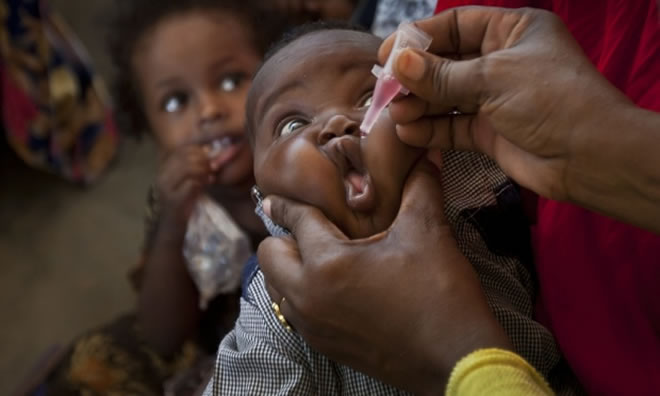Hopes high that virus beaten as Somalia and Nigeria reach milestone, but experts counsel caution amid fears Ebola has undermined healthcare systems

A child in Mogadishu receives drops during the intensive vaccination campaign against wild polio that has helped Somalia check the disease. Photograph: Ben Curtis/AP

Friday, February 13, 2015
Africa has gone six months without any new cases of wild polio for the first time, experts say, raising hopes that the disease could be wiped out on the continent sooner than expected.
Wednesday marked half a year since the last polio case in Somalia. Nigeria achieved the same landmark on 24 January, though it has suffered some cases of vaccine-derived polio, a rare mutation from the oral polio vaccine in areas of poor sanitation.
“This is incredible progress,” said the Global Health Strategies, a New York-based health consultancy. “This is the first time ever that Africa has gone a full six months without a single case of wild polio virus. Combined with the recent successes in Nigeria, today’s milestone is a strong sign that Africa may soon be polio-free.”
Polio, a highly contagious viral disease that causes lifelong paralysis or even death, has been the target of massive education and child vaccination campaigns in several countries. The Bill & Melinda Gates Foundation’s annual letter for 2015 predicts: “We can get polio out of Africa this year and out of every country in the world in the next several years.”
Polio remains endemic in three countries: Pakistan, Nigeria and Afghanistan. In Nigeria, case numbers fell by 92% between 2013 and 2014. Dr Oyewale Tomori, president of the Nigerian Academy of Science, said on Thursday: “We’re excited but very cautious. My country should not celebrate prematurely. Global regulations say that to be declared free of polio you must have three years with no new cases. Six months is just a step along the way.”
He attributed Nigeria’s improvement to greater engagement with communities, including traditional leaders and local councillors. “Instead of being top heavy, it was at the grassroots.” There has also been increased accountability for officials and families. “If you’re told to go and vaccinate your children and don’t do it, something will happen to you.” Additionally, said Tomori, technology such as mobile phones has made it much easier for the emergency operations centre to trace people at any particular time.
Similar approaches helped Nigeria smother an Ebola outbreak swiftly last year, but Tomori expressed frustration that the polio campaign lost focus due to the distraction of elections in 2007 and 2011, and warned there could be a repeat when polls are held next month. “We’ve done some good work but we’ve been close before and polio has bounced back. If the government says, ‘We have already eradicated polio,’ then people think there is no need to vaccinate children.”
He added: “If you want to eradicate polio in Nigeria, you have to eradicate an attitude to work. Some people are not doing their work with integrity. It’s changing now because of sanctions: people are getting punished.”
Yet Tomori remains optimistic about whether a polio-free Africa can happen. “I believe so. If only we’d done what should be done, it shouldn’t have lasted this long.”
There are other reasons to be cautious, including Ebola’s impact on healthcare systems in west Africa and Islamist militancy in Nigeria and Somalia, making some areas insecure and hard to reach. Somalia suffered its first outbreak of polio in six years in May 2013, starting with a two-year-old girl in Mogadishu and sparking a nationwide vaccination campaign by the Somali authorities supported by the World Health Organisation and Unicef, the UN children’s agency. There were 194 cases in 2013, most of them children, but this was slashed to just five cases in 2014, all in the north-east region of Puntland. The last case was reported there on 11 August 2014.
Steven Lauwerier, Unicef’s representative in Somalia, said: “It is excellent news that Somalia has seen six months without a single polio case and credit must be given to all those involved in the huge vaccination effort. However, we must not let down our guard. Polio remains a serious threat in Somalia, particularly to the children, and we must continue our intensive vaccination campaigns.”
The positive news from Africa stands in contrast to last May’s declaration of a public health emergency by the World Health Organisation as polio returned to countries that had been free of it. Pakistan has registered seven cases of wild polio so far in 2015.
Source: The Guardian